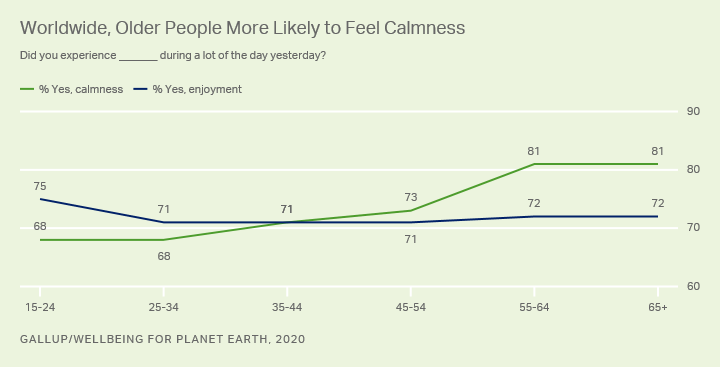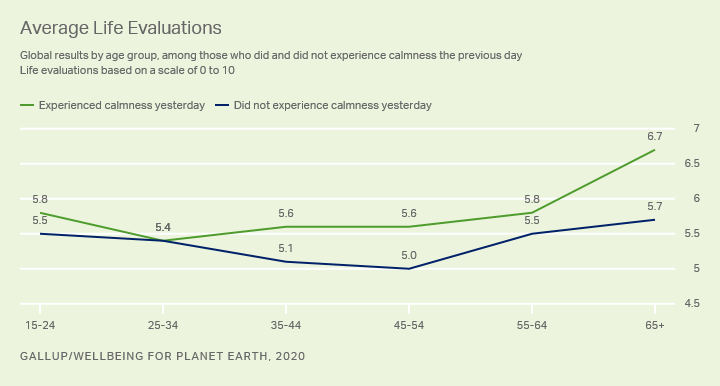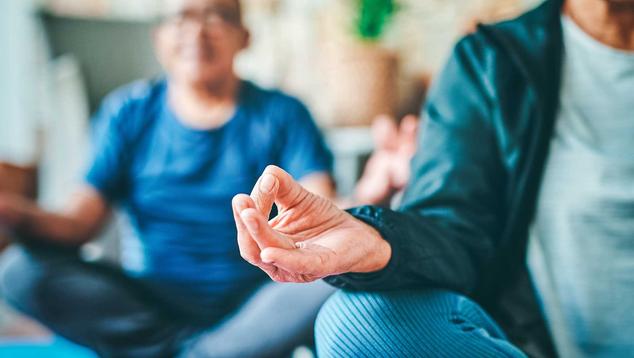While calmness seems to be in short supply in these troubled times, a new Gallup analysis suggests that older people around the world felt a greater sense of it in 2020 compared with younger people, which may have had a positive effect on the older generation's overall wellbeing.
Worldwide, about two-thirds of people between the ages of 15 and 34 (68%) said they experienced calmness during a lot of the previous day, compared with at least 80% among all groups aged 55 and older. This pattern was absent for enjoyment, another positive emotion that the Gallup World Poll measures. The percentage of people saying they experienced enjoyment was relatively consistent across age groups.

Alt text: Line graph. In 2020, Gallup partnered with the Wellbeing for Planet Earth Foundation to broaden the study of wellbeing by testing more globally inclusive perspectives. This included adding "calmness" to the list of feelings that the World Poll asks people about to gauge their emotional state. Worldwide, about two-thirds of people between the ages of 15 and 34 (68%) said they experienced calmness during a lot of the previous day, compared with at least 80% among all groups aged 55 and older.
In 2020, Gallup partnered with the Wellbeing for Planet Earth Foundation to broaden the study of wellbeing by testing more globally inclusive perspectives. This included adding "calmness" to the list of feelings that the World Poll asks people about to gauge their emotional state.
Emotions such as calmness are included in wellbeing studies less often than those that produce a stronger physiological response, such as cheerfulness and excitement. But results from the 2020 World Poll suggest calmness is no less important to people; in fact, strong majorities in all regions say they would prefer a calm life to an exciting life. Notably, the preference for a calm life increases with age; 64% of adults younger than 35 around the world respond this way, versus 86% of those 50 and older.
Calmness Linked to Higher Average Life Ratings in Middle Age and Later
The global data also support prior research showing that the ability to maintain a calm demeanor is important to sustaining high levels of wellbeing throughout one's life. Previous wellbeing studies have documented a U-shaped curve in life evaluations over the life cycle. When people are asked to rate their lives on a 0-to-10 "ladder" scale, where 0 represents their worst possible life and 10 their best possible life, average ratings tend to drop somewhat between young adulthood and middle age before rising again after age 55.
Results from the 2020 World Poll reveal that, while this U-shaped pattern is noticeable at the global level among people who did not experience calmness the previous day, it is absent among those who say they did.
The pattern suggests those who are better able to manage stress in middle age view their lives more positively. One common stressor for those aged 45 to 54 is likely the presence of children: Among those in this age range with children aged 15 or younger in the household, 68% experienced calmness the previous day, versus 78% among those without children. This relationship may have been particularly relevant in 2020, when COVID-19 kept many of the world's children from physically attending school.

Alt text: Line graph. life evaluations diverge later in life between those who did and did not experience calmness the previous day. Among people aged 55 to 64, average ratings of calmness are relatively close between the two groups (5.8 vs. 5.5, respectively).
Notably, life evaluations also diverge later in life between those who did and did not experience calmness the previous day. Among people aged 55 to 64, average ratings of calmness are relatively close between the two groups (5.8 vs. 5.5, respectively).
But ratings rise more sharply in the highest age groups among those who did experience calmness the previous day than those who did not. Among people aged 65 or older, average ratings are a full scale point higher among those who experienced calmness.
Higher life ratings among older people who experienced calmness may partly reflect the benefits of managing stress for healthy aging. Earlier studies demonstrate links between stress and factors such as cognitive decline and cardiovascular disease.
Implications
The development of COVID-19 vaccines in less than a year is a vivid reminder of how medical science has dramatically increased life expectancy around the world. One result of the ability to combat even the most virulent infectious diseases is that chronic conditions such as heart disease, stroke and dementia have now replaced communicable diseases as the leading causes of death in many countries.
One important factor in mitigating several such conditions is the ability to effectively manage long-term stress, which is directly linked to cognitive decline and cardiovascular disease. Stress is also linked to a range of risky behaviors like smoking, poor nutrition and lack of exercise that can lead to chronic diseases.
As the World Poll data indicate, people who maintain a sense of calm in their daily lives also rate their lives better. The results call for further analysis of conditions and interventions that promote calmness as a component of wellbeing and healthy aging.
Later this year, Gallup and the Wellbeing for Planet Earth Foundation will release results from their latest global study.
Read the chapter in this year's World Happiness Report based on the research that Gallup and the Wellbeing for Planet Earth Foundation have been doing together.


